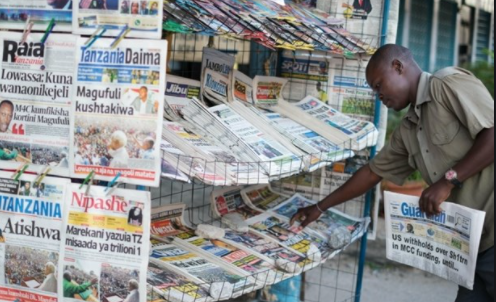MORE and more print media in Tanzania are facing tough economic times, with major media outlets expecting to either close business or jump to digital production as readers’ purchasing power is steadily declining, SAUTI KUBWA has learnt.
On 1st January 2020, Global Publishers, a media house that has been selling yellow journalism for more than 15 years now, became a new addition to a list of big media houses stopping publications in the face of economic turbulence.
Global Publishers mainly covers exaggerations of news events, scandal-mongering, or sensationalism through its weekly publications Uwazi, Ijumaa and Champion – is joining another giant, New Habari (2006) to stop printing. The latter is the publisher of Mtanzania, Rai and Dimba newspapers.
Abdallah Mrisho, the Global Publisher general manager, said they have decided to stop publication because the newspaper business is almost becoming impossible due to various factors., including the buyers’ economic hardships.
“Things are not what they used to be. Now, every person is looking at feasible priorities – what to buy and how to spend the meagre income. So, it obvious that when someone chooses to drop an item on the shopping list, a newspaper is likely to be that item,” he said.
Mrisho said they are now going online, hoping the business model will pick up soon as it is cheaper than a hard copy. A hard copy of his company’s products is sold at Sh, 800 (USD 40cts).
Dennis Msacky, the New Habari managing editor, said they were switching to online just because printing was “chewing” huge amounts of money.
“There is no way out. Printing business is dying, so for survival, we must embrace digital production,” said Msacky.
Tanzania’s giant media house, The Guardian Limited, has downsized the number of pages of its flagship publication – The Guardian – from 36 to 20 to minimize costs; and it has stopped printing weekend editions.
A veteran journalist and media consultant, Ndimara Tegambwage, said that for newspapers to survive, they should be more innovative in adapting to technological advancement and in using data credibly.
More print media houses in Tanzania are already downsizing their print orders while others are contemplating to shut down completely due to economic hardships that have made some of them fail to pay their reporters for over 12 months.
According to Tegambwage, the declining of traditional print news, shuttering newspapers, will be a big blow in Tanzania, mainly affecting the development of democracy as well as killing the knowledge trend that has is associated with the newspapers.










